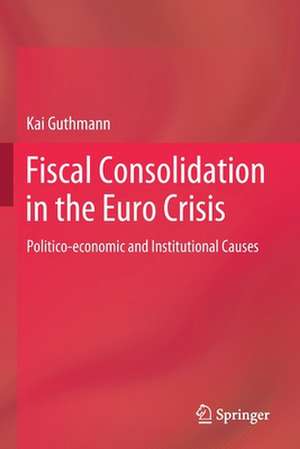Fiscal Consolidation in the Euro Crisis: Politico-economic and Institutional Causes
Autor Kai Guthmannen Limba Engleză Paperback – 14 sep 2021
| Toate formatele și edițiile | Preț | Express |
|---|---|---|
| Paperback (1) | 692.56 lei 6-8 săpt. | |
| Springer International Publishing – 14 sep 2021 | 692.56 lei 6-8 săpt. | |
| Hardback (1) | 698.62 lei 6-8 săpt. | |
| Springer International Publishing – 13 sep 2020 | 698.62 lei 6-8 săpt. |
Preț: 692.56 lei
Preț vechi: 814.78 lei
-15% Nou
Puncte Express: 1039
Preț estimativ în valută:
132.52€ • 144.40$ • 111.67£
132.52€ • 144.40$ • 111.67£
Carte tipărită la comandă
Livrare economică 23 aprilie-07 mai
Preluare comenzi: 021 569.72.76
Specificații
ISBN-13: 9783030577704
ISBN-10: 3030577708
Ilustrații: XIV, 192 p. 13 illus., 1 illus. in color.
Dimensiuni: 155 x 235 mm
Greutate: 0.3 kg
Ediția:1st ed. 2021
Editura: Springer International Publishing
Colecția Springer
Locul publicării:Cham, Switzerland
ISBN-10: 3030577708
Ilustrații: XIV, 192 p. 13 illus., 1 illus. in color.
Dimensiuni: 155 x 235 mm
Greutate: 0.3 kg
Ediția:1st ed. 2021
Editura: Springer International Publishing
Colecția Springer
Locul publicării:Cham, Switzerland
Cuprins
Introduction.- Fiscal Adjustment in Europe.- Theoretical Framework: Austerity's Institutional Origins.- Empirical Analysis: Intra-EMU Heterogeneity & Austerity.- Adjustment by Force: The Realization of Austerity.- Conclusion.
Notă biografică
Kai Guthmann is an independent scholar of comparative political economy and European studies, and an entrepreneur based in Bern, Switzerland. In 2018 he received his doctorate in Political Science from the University of Bern. He has also studied at the University of Konstanz, Rutgers University, and Princeton University, and holds an MA in Politics and Public Administration (Konstanz) and a Master of Public Affairs and Politics (Rutgers).
Textul de pe ultima copertă
This book sheds new light on if and why, between 2009 and 2015, European governments succeeded or failed in initiating and actually realizing some of the farthest-reaching austerity plans in modern history. The author analyzes the economic and political context and the underlying causes of austerity and economic adjustment packages during the Euro crisis. In doing so, he shows that austerity has its roots in an institutional mismatch between capitalist diversity in the Eurozone on the one hand, and an ill-conceived common economic regime on the other. In this context, austerity trumped politics, and even democracy itself. The book will appeal to scholars of political science and comparative political economy, as well as governmental policymakers and practitioners in the finance sector.
Caracteristici
Sheds new light on the far-reaching austerity plans of European governments Provides empirical analyses of intra-European Monetary Union heterogeneity and austerity Analyzes the economic and political context of economic adjustment packages during the Euro crisis
